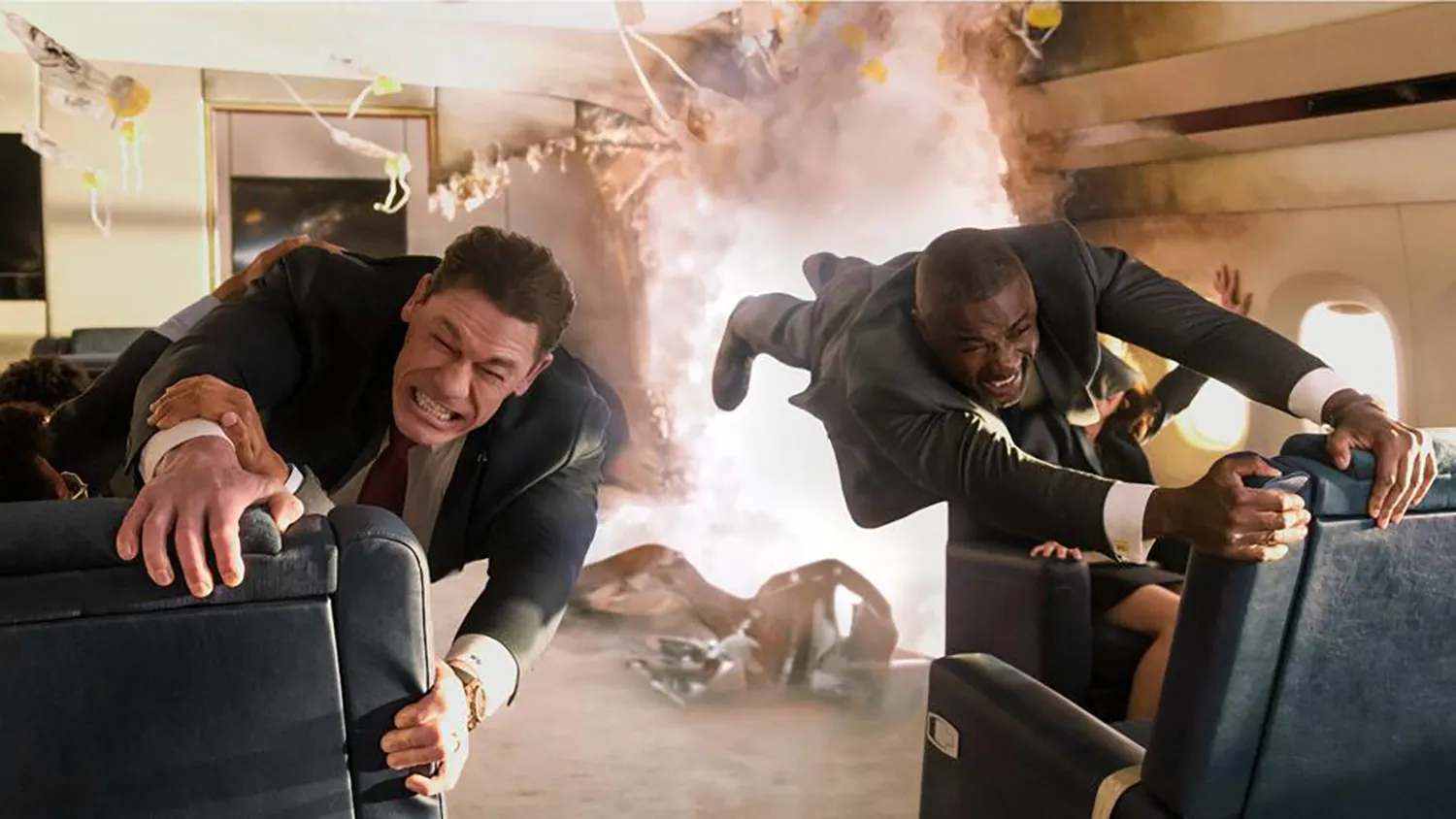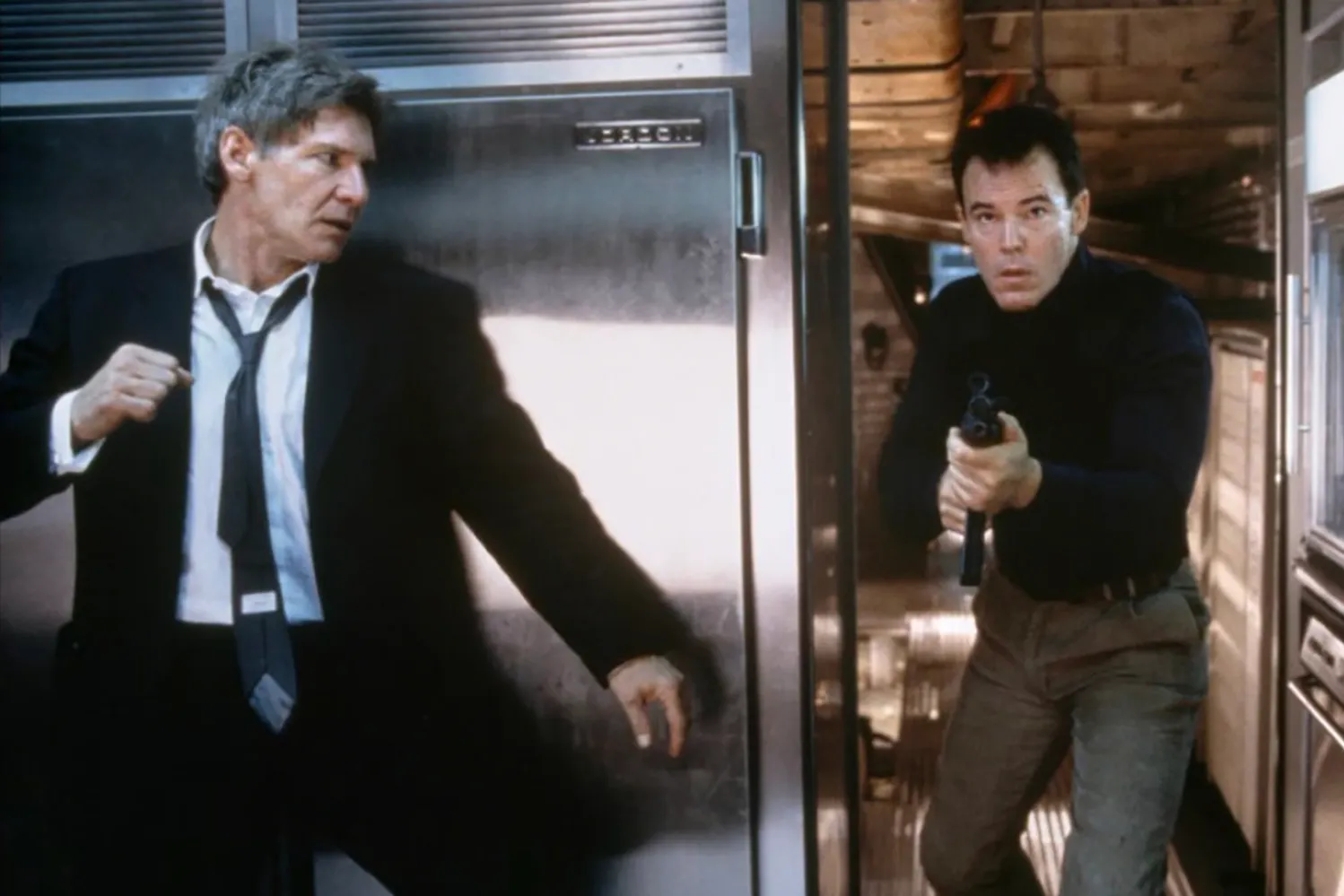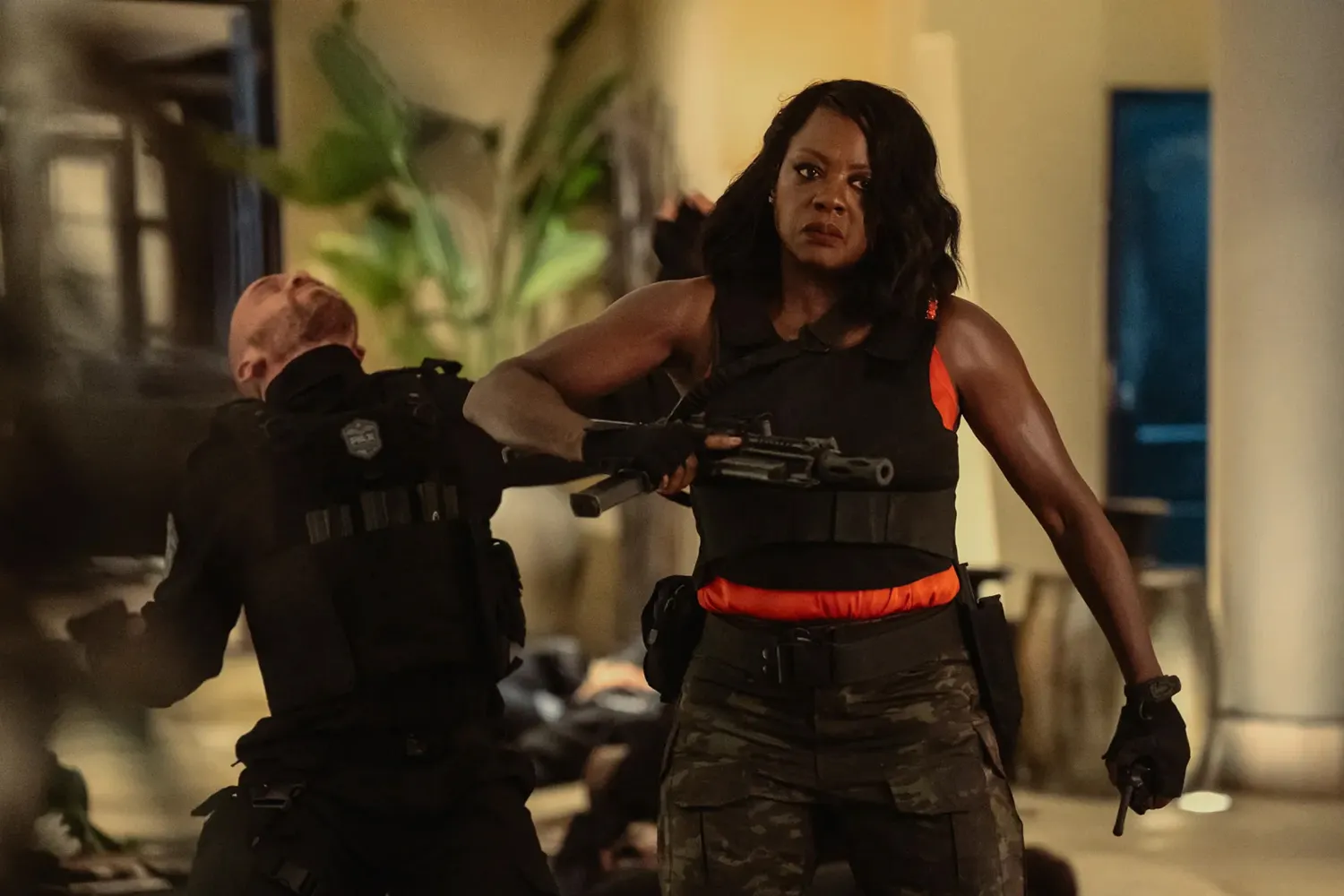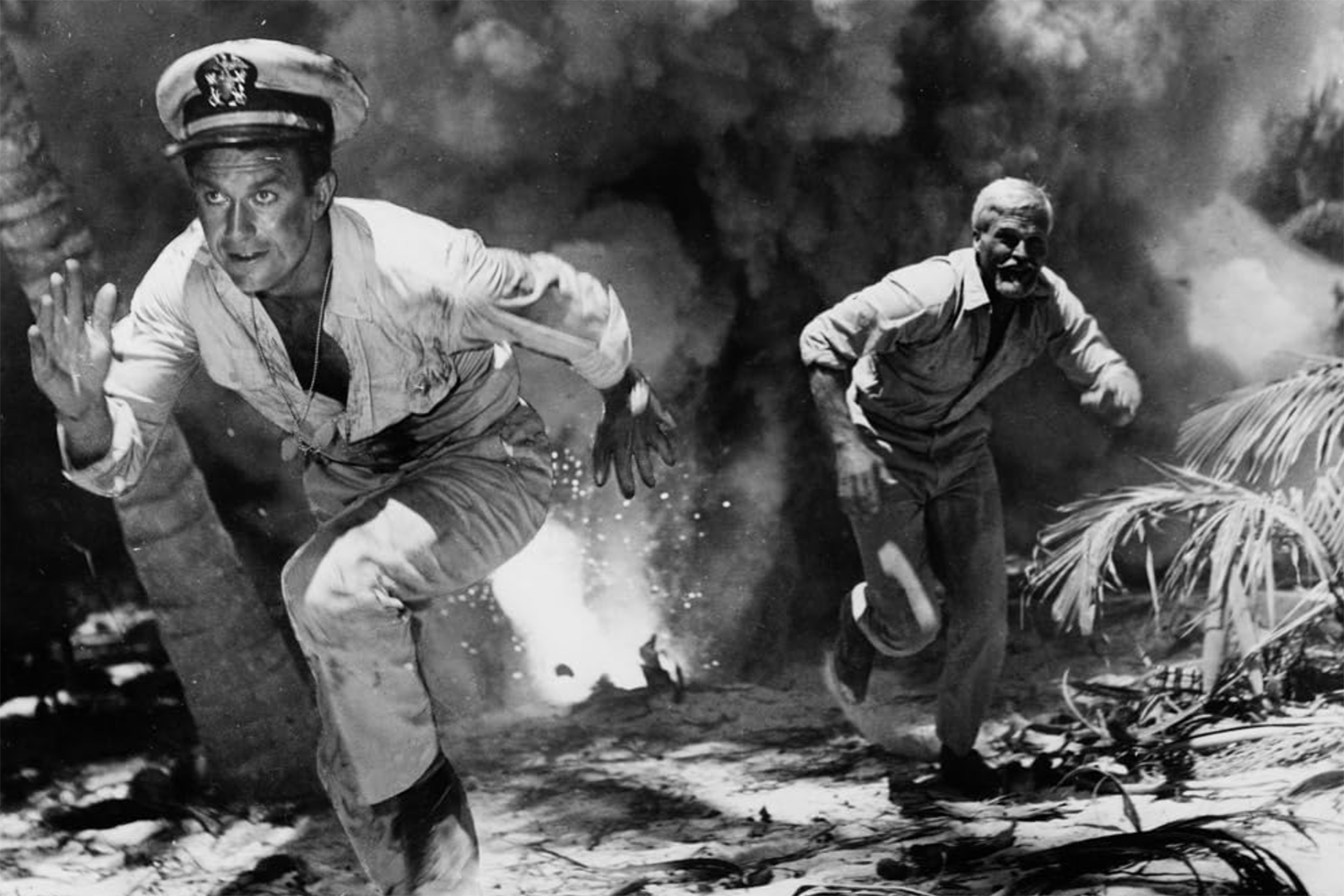When Winston Churchill popularized the phrase “special relationship” to describe the strong bond between the United States and the United Kingdom, I wonder if he could have predicted the new action-comedy Heads of State. This cultural curiosity, available to stream on Prime Video, represents the transferal to an ally of a uniquely American fixation: the leader that not only leads but also kicks ass.
Heads of State—which I strongly endorse, should you find yourself up late a few drinks deep with no one to talk to—is an idiotic fantasy in which John Cena and Idris Elba end up jumping out of an exploding plane, dangling from a helicopter, leaping off a speeding train, blazing an armored car through a wall of fire, and attending a NATO summit. (Weirdly, that last one is the film’s climax.)
Cena, the WWE wrestler, plays a Hollywood action hero named Will Derringer (whose biggest success was the Water Cobra series) who has recently been elected president. He’s arrogant and a little dense but also charming as hell with a kind heart. Elba, the only actor to have both played Nelson Mandela and get voted People’s Sexiest Man Alive, plays British Prime Minister Sam Clarke, almost at the end of his first term and worn to the nub by the stresses of the job yet deep down still the idealist who bootstrapped himself up from the working class, attended Cambridge, and spent some years in the military.
After a first joint press conference that does not go well, their respective comms teams suggest they put on a smile and a show for the public. Derringer offers Clarke a ride on Air Force One to a NATO meeting in Trieste, Italy, but along the way the plane is hijacked. The two parachute out, landing without communication in Belarus. (I wonder if the Max series The Eastern Gate, set predominantly in that troubled nation, was streaming on the plane?)

The film was directed by Ilya Naishuller, a Russian-born director who studied at New York University and has made two of the more extreme action films of the last decade, Hardcore Henry and Nobody. (He has also directed a music video for the Weeknd.) That the first major set piece in Heads of State is set on Air Force One is particularly gutsy of Naishuller, considering that the great Wolfgang Petersen set one of the finest action movies of the 1990s almost entirely in the same location.
That film, Air Force One, starred Harrison Ford as a noble, interventionist U.S. president almost undone by a Russian terrorist (Gary Oldman). Like Die Hard, much of the film’s success is due to its internal geography—the audience is well aware of where everyone is at all times, as tension is amped up until the final showdown.
In great U.S. action-adventure fashion, both Air Force One and Die Hard get a great catchphrase that plays to their performer’s strengths. Bruce Willis gets to say “yippiee-ki-yay, motherfucker,” while Ford—the bold, blunt voice of the United States—is as subtle as a block of concrete, demanding of Oldman: “Get off my plane!” Ford isn’t just the leader of the free world; he’s a quick-thinking, one-man army who served his nation in Vietnam, so he’s able to preserve the status quo and look cool while doing it.

A major narrative switcheroo in Air Force One is the sequence in which you think Ford evacuates the plane (his plane!) via an emergency pod. That’s exactly what Donald Pleasence did as a movie president when his Air Force One was hijacked by terrorists in John Carpenter’s Escape From New York, a film shot in 1980, when Jimmy Carter was still in the White House—not exactly a period known for luxuriating in U.S. muscle.
Hollywood’s representation of U.S. presidents certainly changed during the Reagan-Rambo years. A year before Air Force One came Independence Day, in which Earth gets pummeled by space invaders but eventually rallies once the president of the United States, played by Bill Pullman, formulates a plan.
Pullman’s president’s famous speech, in which he says the name of the movie, is like Henry V at Agincourt put through the stupid machine but an even better moment comes when other nations learn that the United States is ready to suit up and kick interplanetary butt.
More recent examples of a battle-ready POTUS are White House Down (from the same director as Independence Day, Roland Emmerich; he and Wolfgang Petersen are both German) and Olympus Has Fallen, both released in 2013. In each film, the White House itself is overrun by baddies, and the president has to fight back. These films are a smidge more realistic, in that the leader of the free world doesn’t go at it alone—in White House Down, Jaime Foxx’s President Sawyer is aided by Channing Tatum, a Secret Service agent named John Cale. Similarly, in Olympus Has Fallen, Aaron Eckhart (President Asher) follows the lead of Gerard Butler, a Secret Service agent named Mike Banning.
Somehow Banning came back for two more movies, London Has Fallen (fighting baddies with Asher when a British prime minister’s funeral comes under attack) and Angel Has Fallen (fighting different baddies in a manner far too complicated to get into right now).

Even though these movies are more about the Secret Service guy, the presidents hold their own. This year, that trend was reversed for G20, a marvelous new entry in the canon starring Viola Davis as an Iraq War vet-turned-politician who has been elected president. At her first G-20 summit, she has to personally save civilization by mowing down murderous Australian bitcoin bro terrorists. Davis going full Stallone is something of a glorious sight, and the action sequences are quite entertaining. When most of the world’s leaders are taken hostage, she scurries away with a Secret Service dude (an old war buddy); the flabby U.K. prime minister; the very sharp South Korean first lady; and the head of the International Monetary Fund, a feisty, diminutive Italian woman. But Davis quickly takes charge and ultimately saves the day. (As in Heads of State, her job includes dangling out of a helicopter; this prerequisite somehow rarely comes up at town hall debates.)
Looking at the list of titles here, one does get a sense that Hollywood likes to repeat itself. What is it about U.S. culture that yearns for an action hero president? They don’t, for example, make these movies in France. I suppose one could say it’s the good old “frontier spirit,” as mythological as that might be, imprinted on the country’s self-identity; after all, George Washington was a working general who beat the snot out of the redcoats. Sure, being book smart is OK, but can you swim 4 miles with a wounded fellow soldier on your back? That’s what really counts. In fact, that specific feat is one of the acts of valor seen in maybe the weirdest presidential action picture of them all, PT 109.
Starring Cliff Robertson and released in June 1963—when John F. Kennedy was president and a year away from what would have been his reelection campaign—PT 109 details the derring-do of a young, Harvard-educated lieutenant in the U.S. Navy who transformed a bucket of bolts into a sturdy ship; helped save pinned-down U.S. soldiers on a Pacific island; and then miraculously kept nearly all of his crew safe after getting rammed by a Japanese destroyer. That lieutenant’s name was John F. Kennedy.
Kennedy was more involved in the making of his own hagiography than you might think. He personally approved Robertson for the role and had a wartime friend act as a liaison between the movie studio and the White House. (He also demanded profits go to surviving family members of the actual PT 109.)

It’s not a great movie, but it’s a fascinating one. Robertson’s performance is eerily sunny—no matter how rotten his situation is, he doesn’t stop smiling. There are also a surprising number of weird cameos: Future sitcom star Normal Fell showing up certainly shatters the illusion of gravitas, and it’s wild to see future Star Trek star George Takei at the helm of the threatening Japanese destroyer. (That’s the same crew position he’d have on the USS Enterprise serving the JFK-esque James T. Kirk.)
Former Sen. John McCain’s time in Vietnam, a little more recent, was made into a direct-to-basic-cable film in 2005 called Faith of My Fathers. It certainly lacked the same technicolor punch as PT 109, but it still got made near the peak of his political relevance.
These movies represent a uniquely U.S. form of self-expression. I joked earlier about Churchill, and cinephiles know that Richard Attenborough, who would later direct Gandhi and co-star in Jurassic Park, released the film Young Winston in 1972. Its title reflects Young Mr. Lincoln, the John Ford-Henry Fonda collaboration from 1939 that, yes, puts a future head of state on a pedestal but pre-dates Hollywood’s decision to send these characters into combat.
Young Winston was a financial success in Britain (though not elsewhere), and a lot of it does focus on Churchill’s time in military service, including his daring prison escape during the Boer War. (A story from history retold in the recent film G20, oddly enough.) But action is only a small percentage of the full film. There’s a lot of young Winston dealing with corporal punishment at school, reciting lines of verse, and dancing around the weird sexual dynamics of his parents (played by Robert Shaw and Anne Bancroft). For every scene of charging cavalry, there are two of a disapproving father. Britain—get it together and make a proper movie about your national hero, will you?!
It being summer and near the Fourth of July, I’m proud that Britons have something like Heads of State to enjoy, where they can see Elba knock the tar out of villains while letting Cena know what a dumbass he is. As rebellious colonists, providing this kind of entertainment is the least Hollywood can do after all these years.
The post Why Must Hollywood Presidents Kick Ass and Take Names? appeared first on Foreign Policy.




